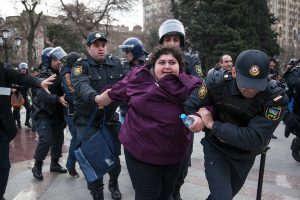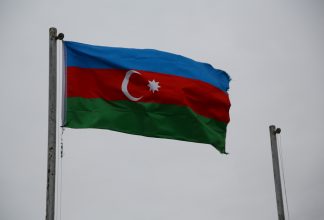It is Time for the Council of Europe to Take Off its Blinkers Over Azerbaijan
The outcome of Azerbaijan’s elections were never in doubt, and the consitutional referendum on September 26. that one prominent activist described as “a full-frontal assault on democracy” was no exception.

The numerous changes to the constitution largely serve to further entrench President Ilham Aliyev’s iron grip on power. The changes pave the way for his young son to eventually follow in his father’s footsteps, giving the government more legal room to crack down on activists and any semblance of free media that might exist, that is, the very few uncooperative journalists that are still left in situ or not languishing behind bars.
Local and international human rights groups decried the atmosphere ahead of the referendum, where opposition parties were prevented from campaigning, activists and journalists were harassed and jailed, and information on what, exactly, was on the ballot was impossible to ascertain except for a handful of independent, online media outlets.
None of this seemed to particularly bother the PACE observation mission, who could not find much to criticise:
”The voting process was transparent, well organised, efficient and peaceful throughout polling day, and that no serious violations were observed during the counting process, and that is why we respect the will of the Azerbaijani people”;
The statement also noted that there “was campaigning on the referendum during which both sides – supporters and opponents – were able to present their opinion,” an assertion that critics were quick to point out has absolutely no basis in reality.
The opposition groups that attempted to meet the onerous registration requirements to publicly campaign faced unprecedented harassment and were technically forced to withdraw their petition. Approximately two hundred protesters were arrested at the two rallies that the totalitarian regime eventually agreed to sanction.
PACE could not find any voting irregularities, but the country’s two main independent media outlets, Meydan TV and Azadliq Radiosu, spent referendum day posting videos and photos of ballot stuffing and carousel voting. While the election commission reported a massive turnout, official cameras at voting stations live streamed videos of empty voting stations and lonely election officials.
The referendum is another chapter in the Council of Europe and Azerbaijan’s sordid history. In 2013, a PACE delegation struggled to find fault with an election when a government smartphone app released the results before voters even went to the polls.
Two years later, when other observers stayed away after Baku imposed conditions that made credible election observation impossible, PACE was undeterred, and again lauded Azerbaijan’s democratic bonafides.
The numerous changes to the constitution largely serve to further entrench President Ilham Aliyev’s iron grip on power. The changes pave the way for his young son to eventually follow in his father’s footsteps, giving the government more legal room to crack down on activists and any semblance of free media that might exist, that is, the very few uncooperative journalists that are still left in situ or not languishing behind bars.
Local and international human rights groups decried the atmosphere ahead of the referendum, where opposition parties were prevented from campaigning, activists and journalists were harassed and jailed, and information on what, exactly, was on the ballot was impossible to ascertain except for a handful of independent, online media outlets.
None of this seemed to particularly bother the PACE observation mission, who could not find much to criticise:
”The voting process was transparent, well organised, efficient and peaceful throughout polling day, and that no serious violations were observed during the counting process, and that is why we respect the will of the Azerbaijani people”;
The statement also noted that there “was campaigning on the referendum during which both sides – supporters and opponents – were able to present their opinion,”an assertion that critics were quick to point out has absolutely no basis in reality.
The opposition groups that attempted to meet the onerous registration requirements to publicly campaign faced unprecedented harassment and were technically forced to withdraw their petition. Approximately two hundred protesters were arrested at the two rallies that the totalitarian regime eventually agreed to sanction.
PACE could not find any voting irregularities, but the country’s two main independent media outlets, Meydan TV and Azadliq Radiosu, spent referendum day posting videos and photos of ballot stuffing and carousel voting. While the election commission reported a massive turnout, official cameras at voting stations live streamed videos of empty voting stations and lonely election officials.
The referendum is another chapter in the Council of Europe and Azerbaijan’s sordid history. In 2013, a PACE delegation struggled to find fault with an election when a government smartphone app released the results before voters even went to the polls.
Two years later, when other observers stayed away after Baku imposed conditions that made credible election observation impossible, PACE was undeterred, and again lauded Azerbaijan’s democratic bonafides.


